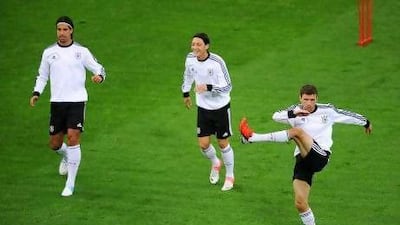Out of darkness, there came light. Germany's renaissance is often attributed to their disastrous campaign in Euro 2000, prompting a root-and-branch overhaul of youth development and the embracing of an attacking philosophy.
Yet the emergence of the current team can be dated back to two games, separated by five years and a gamut of emotions. One was an abject failure, another a roaring success.
Euro 2000 was the nadir, but Euro 2004 was another low. Having failed to beat Latvia, Germany's final group game was against a second-string Czech Republic side – the first 11 had already clinched qualification for the quarter-finals – and ended in a 2-1 reverse.
"Not a humiliation but highly unsatisfactory," said Rudi Voller, in his final game as manager before the double act of Jurgen Klinsmann and Joachim Loew exerted a revolutionary effect.
"There were bright spots," Voller added, identifying two. "Philipp Lahm, Sebastian Schweinsteiger."
The full-back was 20, the midfielder – since, known far more as Bastian – 19.
They were joined, for the first time in a competitive game, by another teenager, Lukas Podolski. Now that trio, still at the height of their powers, have 284 caps.
They are the older generation, even though two of them are only 27.
Five years and six days later, the next generation began to attract an audience outside Germany. In a ludicrously one-sided final to the European Under 21 Championship, Germany destroyed England 4-0. Five of the probable starting line-up against Italy tonight began that match in Malmo: Manuel Neuer, Jerome Boateng, Mats Hummels, Sami Khedira and Mesut Ozil.
One, in particular, caught the eye, leading his coach to pronounce that the functional Germans had acquired flair. "We have our own [Lionel] Messi," said Horst Hrubesch, the former Germany striker turned Under 21 manager. "Our Messi is Ozil."
The playmaker was the star of that game, just as he garnished the following summer's World Cup and threatens to be the dominant figure of this tournament. Indeed, a quartet progressed from juniors to seniors in a season, a startling rise that rendered the precocious trio of Lahm, Schweinsteiger and Podolski the ancien regime when still in their mid-20s.
The exception was Hummels, played as an anchor midfielder then, and in the heart of defence now. His former role is a sign of the centre-back's assurance in possession, which has impressed a still better passer. He is Zinedine Zidane's pick of the players at Euro 2012.
It is rare that five members of an U21 team graduate to a successful national side.
It could, however, have been seven: neither Holger Badstuber nor Thomas Muller was even in the squad, though 12 months later the attacker won the World Cup's Golden Boot, while his Bayern Munich teammate was on the German bench.
And if Muller and Podolski do not start, it will be because of Marco Reus and Andre Schurrle, a pair who are still younger.
Either way, only Mario Gomez splits the two generations. Only Miroslav Klose is older than them. The German production line is as prolific as the factories in the Ruhr, delivering footballers with a guarantee of quality.
The common denominators are a precocious maturity. German mental strength has become a cliche – especially in the context of penalty shoot-outs – but a more adventurous, attacking group of players have inherited the intelligence of their predecessors.
Watch Ozil and Muller and their most obvious asset is their movement, the result of keen football brains.
See Khedira charging into space Ozil has vacated or interchanging with Schweinsteiger and it is apparent that he, too, reads the game better than many players a decade older than his 25.
Tactical knowledge is a traditional strength of Italian teams. It enabled them to pick off Germany, albeit deep into extra time, in their 2006 World Cup semi-final.
But this is a more talented German team, with the men from Malmo and the rising talents who are younger still. The humiliation of 2000 and the hurt of 2004 belong to another age.
Follow us


